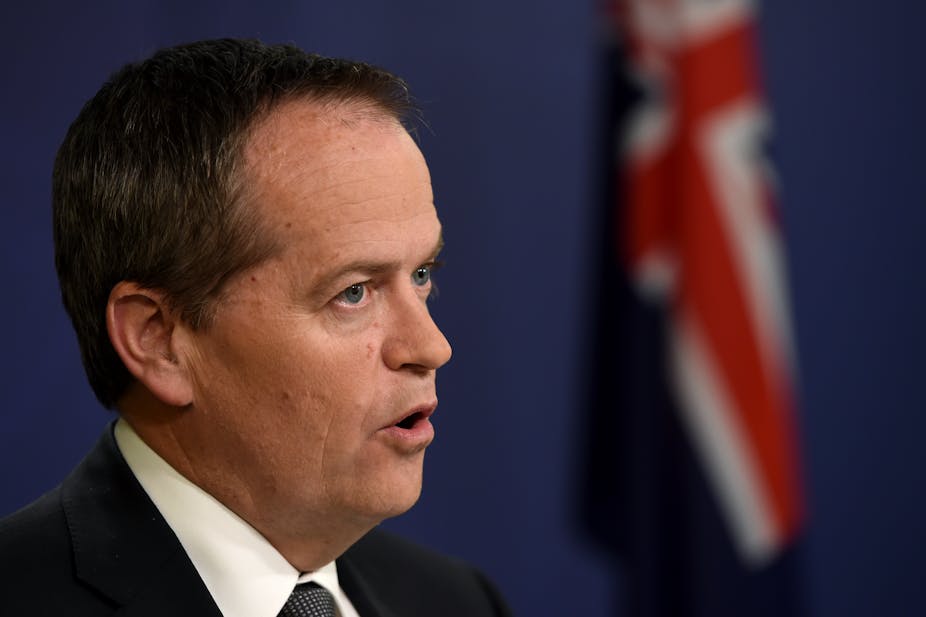Bill Shorten has clearly taken Tony Abbott as his role model as opposition leader. Shorten’s refrain of “broken promises” and “no more taxes” has an eerie ring of familiarity to it, and risks turning the declining number of Labor voters away – even if they support his rhetoric in the short term.
The deliberate strategy of the government to raise the spectre of higher taxation is an enormous opportunity for a social democratic opposition, who seem determined to miss it. And because Tony Abbott misses no opportunity to blame the previous government for fiscal mismanagement it merely reinforces the spectacle of politics as a negative blame game.
Could Shorten instead not welcome the government’s recognition that if we want decent services they need be paid for? He could point out that taxation in Australia is already lower than in most OECD countries, and that Abbott, in talking of sharing the load – and cutting the threshold for his own paid parental leave project – has belatedly embraced a Labor philosophy.
It is the job of oppositions to oppose. But it is also their job to articulate a different vision to that of the government. There is an opportunity for Labor to welcome the government’s recognition that there are public goods that need be paid for communally, and to stake out clearly their commitment to a more expansive but also equitable sharing of the burdens of providing these services.
The government’s rhetoric on next week’s budget has so far been around the combination of slashing services with some attempts to increase revenue. So far, the Greens, bolstered by the WA Senate result and opinion polls, have been much shrewder in capitalising upon this than Labor, which seems strangely absent from debates about the purpose of government.
But this is traditional Labor territory. It allows them to both defend their record in government and to sound positive. The proposals of the Commission of Audit to cut the minimum wage and cut back on welfare spending are clearly intended to prepare us for a budget that will look generous in comparison, but there is little sign that Labor understands this.
When Abbott justifies a new levy as part of “sharing the burden” to fix the budget, he gives Labor the chance to explain the fairness of the mining tax. When the government speaks of major investment in their clean energy policies while prioritising new roads over any support for public transport, they are opening up an issue that Labor should use to their advantage in outer suburbs.
The opinion pages of our newspapers are full of advice to Labor that they should scrap their more radical proposals – if indeed anything remains that could be so described – and to commit to yet more economic reforms. But reforms can take many shapes, and any opposition needs to define how theirs would differ from those of the current government.

To concentrate on attacking the government and make itself a small target by moving to the centre was the tactic followed unsuccessfully in the past, most recently by Kim Beazley. From Whitlam on, Labor has generally won government when it has presented a clear alternative to the Coalition, and one that was sometimes portrayed as radical. The Kevin Rudd who won in 2007 talked of visionary change far more than the Rudd who lost government in 2013.
No Labor leader could have won in 2013, partly because of Rudd’s own exploits. But there are few signs that Labor can sit back and wait for the government to implode as theirs did. Conservatives thrive on opposition because they represent a return to an imagined status quo, even if in office they are often more radical – in the sense of overturning the established order of things – than the nominal parties of the left.
The Labor Party needs both to rebuild trust in a soiled brand and offer a genuine alternative vision to that of the Abbott government. The former will be helped by the increasing spotlight on dodgy dealings as bipartisan, although in the short run that will benefit both the Greens and the Palmer United Party.
An alternative vision, however, needs some clear commitments from Shorten and Labor to a story of government that articulates a counter-narrative to that which assumes all taxation is bad and consistently denigrates the provision of services through government.
As long as Labor evades the question of how these services can be paid for – as the government has successfully painted the legacy of the Gillard years – they are deeply vulnerable.
Were Shorten to say his first act would be to revisit the Henry tax review and spell out what carefully targeted taxation increases could mean in terms of sustaining the services most of us take for granted – or desperately want – Labor would have a chance of setting the agenda.
Attacks on broken promises worked for Abbott, but it is not a trick that is easily repeated.

